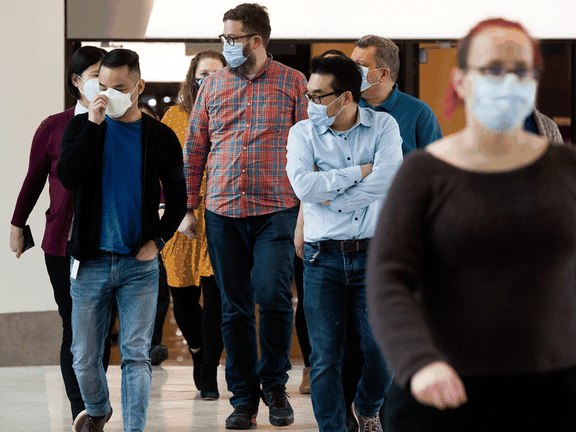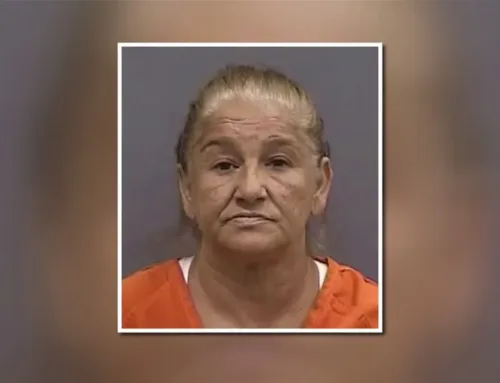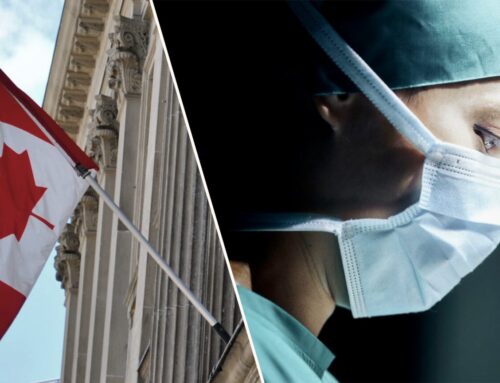March 1, 2022
-National Post
EDMONTON — The Alberta government has vowed to ban municipalities from enacting their own COVID-19-related public-health rules, preventing them from contradicting the direction of the provincial government, which has dropped nearly all pandemic restrictions.
The move, announced Tuesday, once introduced as a bill and passed, would put the province in a position to overrule Edmonton’s mask bylaw, which remains in effect locally. The reforms would limit the powers a municipality has to enact public-health-related bylaws.
“It was a bit odd coming in here not wearing a mask, but it was also pretty awesome,” Premier Jason Kenney said in Red Deer.
Edmonton appears to be the only municipality in Alberta to retain a mask bylaw, and certainly the largest city to have one; Calgary dropped its municipal mask bylaw alongside the provincial mandate on Tuesday. (Under the provincial rules, masking remains in effect on transit and in health-care settings.)
Kenney said a patchwork of public-health policy will only feed confusion and division in the province, and eliminating municipal discretion would prevent “virtue signalling” from local councillors.
“We need to move forward together. There has been too much division over the COVID era in our society,” said Kenney. “We certainly shouldn’t allow political science to be a substitute for public-health science.”
Edmonton Mayor Amarjeet Sohi, speaking Tuesday afternoon, condemned the provincial announcement as “overreach” and warned it could have effects well beyond the COVID-19 pandemic, suggesting the province could use similar moves to interfere in decisions like development plans or smoking bylaws.
“It is about time that provinces recognize us as an equal order of government and do not meddle into the affairs where we can make our own decisions,” said Sohi.
Duane Bratt, a political scientist at Mount Royal University, described Edmonton’s mask policy as “all politics.”
“It’s not all politics by the Kenney government, right? I mean, the city councils of Calgary and Edmonton are playing their own political games,” said Bratt. “Now, maybe not so much when they first imposed it, but keeping it up is a way of showing opposition to the Kenney government…. So, when you talk about politics, there’s the politics of COVID and then there’s the overall politics where the big cities see themselves as a separate sphere, as a counteracting power to the provincial government. And we’ve seen that for a very long time in this province.”
While cities in Canada are “creatures” of provincial governments, Alberta’s Municipal Government Act, seemingly, gives local government wide latitude to pass bylaws regarding “the safety, health and welfare of people and the protection of people and property.”
Lorian Hardcastle, a health law expert at the University of Calgary, said the provincial government does have the authority to adjust the powers of municipalities, but argued it sets a “negative precedent” for the province to intervene when it doesn’t like what a municipality is doing.
“Public health is the purview of all levels of government, municipal, provincial and federal. And municipalities do a ton of important work in the area of public health. They deal with water fluoridation, they pass safety bylaws related to things like bike helmets, they pass bylaws dealing with cannabis and tobacco consumption,” Hardcastle said. Joe Ceci, the New Democrat critic for municipal affairs, said Kenney’s announcement is a “dramatic reversal from when the UCP not only allowed but forced local governments to make public health decisions.” Kenney’s announcement, which comes roughly one month after he hinted at such legislation in a Facebook Live, represents a complete shift from July 2020. At the time, when asked about why there was no province-wide mask mandate, Kenney said Alberta was too large and diverse for one-size-fits-all policy.
“We think these decisions are better taken locally,” Kenney said, at the time.
Now, he said, the argument his government is making is that public health is the province’s responsibility not a municipality’s, and that cities “improvising” health-care policy is “unhelpful and divisive.”
“We appreciate the care and concern of people in municipal government about these issues, and we’re always willing to listen to their views about public-health policy but we think as we go into this phase, getting our lives back to normal, it’s important that there be unity, clarity, consistency,” Kenney said.
Sohi argued that the cities have stepped in when the provincial government had dropped the ball during the pandemic, and that while health care is indeed a provincial responsibility, “protecting the well-being of Edmontonians is also a municipal responsibility.
“This is not about grandstanding. This is not about political support. This is about making good decisions based on the needs of local communities and listening to our health experts,” Sohi said.
Kenney’s announcement may be more or less moot, though, because it will take time to introduce and pass legislation modifying the Municipal Government Act, and Edmonton’s city bylaw will be reviewed by council on March 8. At that point, it may be revoked.
“The vast majority of Alberta’s municipalities have aligned with provincial public health policy,” said Scott Johnston, press secretary Municipal Affairs.
“Other Canadian provinces generally approach municipal bylaws in a similar way to Alberta. Municipalities are provided with broad authority to implement bylaws, with certain limitations. These limitations vary province to province; however, in all instances, provincial legislation trumps municipal bylaws.”
Provincial statistics show there are roughly 9,000 active cases across the province, with 1,224 in hospital and 83 people in intensive-care units; 3,912 Albertans have died from the virus.




